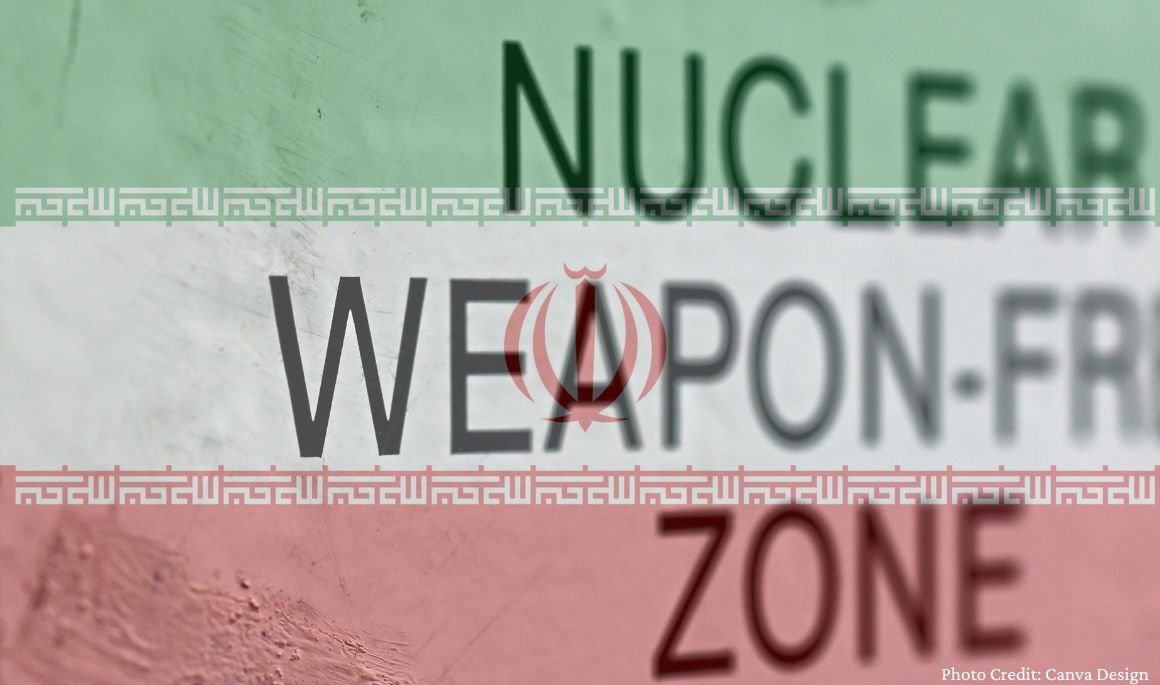- Norwich Blogs
- Blogs
- Khamenei’s Nuclear Fatwa: Religious Ruling or Political Strategy?
Khamenei’s Nuclear Fatwa: Religious Ruling or Political Strategy?
By Dr. Saeid Golkar
This article explores the dual nature of Iran's Supreme Leader Ayatollah Ali Khamenei's 2003 declaration that nuclear weapons are forbidden under Islamic law. While presented as a religious decree, the article suggests that the fatwa serves as a strategic political tool, adaptable to Iran's shifting geopolitical interests and national security considerations. This flexibility underscores the fatwa's role in Iran's broader strategy to navigate international scrutiny over its nuclear ambitions.

Disclaimer: These opinion pieces represent the authors’ personal views, and do not necessarily reflect the official policies or positions of Norwich University or PAWC.
Iranian Foreign Minister Abbas Araghchi recently criticized UN Secretary-General Antonio Guterres for questioning Iran’s nuclear intentions. Guterres urged Iran to clarify its position on nuclear weapons and engage constructively with its neighbors. Araghchi reaffirmed Iran’s commitment to the Nuclear Non-Proliferation Treaty (NPT) and cited a religious decree, known as a fatwa, by Supreme Leader Ayatollah Ali Khamenei, which bans weapons of mass destruction as evidence of Iran’s peaceful nuclear program.
However, growing voices within Iran, including some the IRGC commanders, have urged Khamenei to revise his fatwa to permit the pursuit of nuclear weapons.[1] Initially issued in 2003, this fatwa declares nuclear weapons haram (forbidden) in Islam. While the regime touts this as evidence of its peaceful nuclear agenda, skeptics contend that the ruling is disingenuous and could be overturned if it serves the interests of the Islamic Republic. To assess this claim, it is crucial to understand the structure of Shia clerical authority, the nature of fatwas, and their implications within Islamic jurisprudence.
Understanding Fatwas
Unlike Sunni Islam, Shia Islam has a structured clerical hierarchy. At the top of this pyramid are mujtahid, jurists qualified to issue legal opinions (fatwas). A mujtahid with followers may become a grand ayatollah or marja al-taqlid (source of emulation), whose rulings guide Shia Muslims. Followers financially support their chosen marja through religious taxes (khums).
A mujtahid's most important role as an expert in Islamic jurisprudence is to answer the religious questions of his followers and issue fatwas. A fatwa is an Islamic legal ruling or opinion provided by a qualified mujtahid in response to a question or issue concerning Islamic law (sharia). A fatwa is not a new law, as only Allah is a lawmaker; instead, it is a religious and legal opinion that guides Muslims on specific issues based on the Quran, Hadith (the Prophet's sayings), qiyas, consensus, and other sources of Islamic jurisprudence.
Fatwas are issued in response to direct inquiries (estefta) from followers. They can also be proactive, addressing emerging issues without a specific request. Ayatollah Khomeini’s 1989 fatwa against Salman Rushdie is an example of a fatwa based on estefta, as Iran’s Ministry of Islamic Culture sent him a copy of the book Satanic Verses with a translation and requested his opinion.
The Nature of Khamenei’s Fatwa
Khamenei’s nuclear fatwa has been cited in diplomatic negotiations to assure the West that Iran’s nuclear program remains peaceful. However, its credibility as a binding commitment is questionable for several reasons.
First, fatwas can evolve, adapting to new circumstances and evidence. A fatwa is a jurist’s interpretation of Islamic law; it can be revised as circumstances evolve. Iranian officials, including former President Hassan Rouhani, have admitted that Khamenei’s fatwa was issued to strengthen Iran’s position in nuclear negotiations.[2] Given that fatwas are not divine laws but interpretations of religious principles, they can be retracted or modified if political or strategic considerations shift. Historical precedent suggests that Iranian clerics have changed their rulings on various issues when deemed necessary for the survival of the regime.
Since the fatwa relies on a mujtahid's knowledge, it can evolve with new evidence and various times and contexts. Many fatwas from the past have been revised and adjusted; they are issued based on specific situations, allowing for modifications according to time and place. Consequently, a mujtahid can reassess and change previous fatwas as new information or societal issues emerge. For instance, Khomeini has revised several of his fatwas, including those regarding the permissibility of making and playing chess[3] and the legality of sex reassignment surgery.[4]
Fatwas have historically been reversed or reinterpreted in response to political and technological changes. For instance, rulings on modern banking, the use of technology, and medical advancements have all evolved. If Iran’s leadership determines that nuclear weapons are essential for national defense, a reinterpretation of the fatwa could follow, either by Khamenei himself or by a future Supreme Leader.
Second, unlike secular laws, fatwas are not universally binding and apply only to the followers of the marja who issue them. Khamenei’s ruling is applicable solely to those who recognize him as their marja. Many Iranians do not follow him religiously, and within Iranian military and clerical circles, there are individuals qualified to issue their own rulings.
Third, in Shia Islam, a fatwa differs from a governmental order, which is known ashokum-e hokum. While the former is a personal interpretation, the latter is a directive that must be followed. Khamenei’s nuclear fatwa could be seen as a political statement rather than a binding religious edict. If national security interests dictate otherwise, the fatwa could be reinterpreted as a temporary stance rather than a permanent prohibition.
Some analysts argue that Khamenei’s fatwa is ambiguous, allowing Iran to navigate diplomatic pressures while maintaining flexibility.[5] By presenting the fatwa as a commitment to the international community, Iran can avoid harsher sanctions while keeping open the possibility of revising its stance if geopolitical circumstances change. This strategic use of religious doctrine aligns with Iran’s broader pattern of tactical maneuvering in international relations.
Since the 1979 Islamic Revolution, Shia clerics have held significant political power in Iran. Under velayat-e faqih (guardianship of the jurist), the Supreme Leader serves as both a religious and political authority. However, this role has resulted in ambiguities when it comes to distinguishing religious decrees from political mandates.
While a fatwa is applicable only to the followers of a marja, a governmental order is mandatory for all citizens, including other clerics. For instance, Khomeini issued a governmental order suspending the hajj pilgrimage for three years after the 1987 Saudi crackdown on Iranian pilgrims, even though pilgrimage is a fundamental Islamic duty.
Since a fatwa is a mujtahid's legal opinion, different mujtahids can have different fatwas on the same issue, although this is usually not the case. For example, all Shiite jurists in the past considered a woman's blood money [6]to be half that of a man. However, Ayatollah Sanei issued a fatwa stating that there is no difference between the blood money for men and women because of his new undertaking and knowledge. His fatwa[7] has been called strange, rare or shaze.
Implications for International Agreements
Fatwas' dynamic nature makes them unreliable foundations for international treaties. Unlike constitutional laws or international accords, fatwas are interpretations that can be amended or nullified. Iran’s past behavior further suggests that religious rulings do not always dictate state policy. For instance, despite Khamenei’s fatwa, Iran has continued uranium enrichment and advanced missile development, raising concerns about its true intentions.
Additionally, not all factions within Iran’s ruling elite adhere to Khamenei’s stance. Some members of the Islamic Revolutionary Guard Corps (IRGC) consider themselves mujtahids and may reject his ruling. Historically, internal power struggles in Iran have led to conflicting policies, making the nuclear fatwa an uncertain deterrent.
Conclusion
Khamenei’s fatwa against nuclear weapons is not a binding or permanent prohibition. It is subject to change and applies only to his followers, not all Iranian decision-makers. Furthermore, the distinction between religious rulings and political mandates creates ambiguity regarding its enforcement. Given these uncertainties, relying on a religious decree as the basis for international agreements is impractical.
While the fatwa is a useful diplomatic tool for Iran, its effectiveness as a genuine legal constraint remains doubtful. The study concludes that a fatwa — a flexible and personal interpretation of Islamic law — should not be treated as a definitive commitment in nuclear negotiations. The international community should consider Iran’s actions, not just its religious pronouncements when assessing its nuclear ambitions.
Dr. Saeid Golkar is a UC Foundation Associate Professor in the Department of Political Science at the University of Tennessee at Chattanooga, a senior advisor at United Against Nuclear Iran (UANI), and a Writing Fellow at the Middle East Forum.
[1] https://www.telegraph.co.uk/world-news/2025/02/08/iranian-generals-tell-ayatollah-we-need-nuclear-weapons/
[2] https://www.bbc.com/persian/iran-features-60114980
[3] https://asiasociety.org/education/endgame
[4] https://www.tandfonline.com/doi/full/10.1080/15532739.2016.1250239
[5] https://www.washingtoninstitute.org/policy-analysis/nuclear-fatwa-religion-and-politics-irans-proliferation-strategy
[6] In Islamic law, diya is the financial compensation awarded to victims or their heirs in instances of murder, bodily harm, or unintentional property damage. Diya acts as an alternative to the punishment of qisas, or equal retaliation. In this context, the diya amounts for men and women differ. If a man kills a woman, the family of the woman must pay him a sum before they can seek retaliation. Conversely, if a woman kills a man, she may be killed without any financial compensation being required from her family because the diya for women is less than that for men. Almost half.



